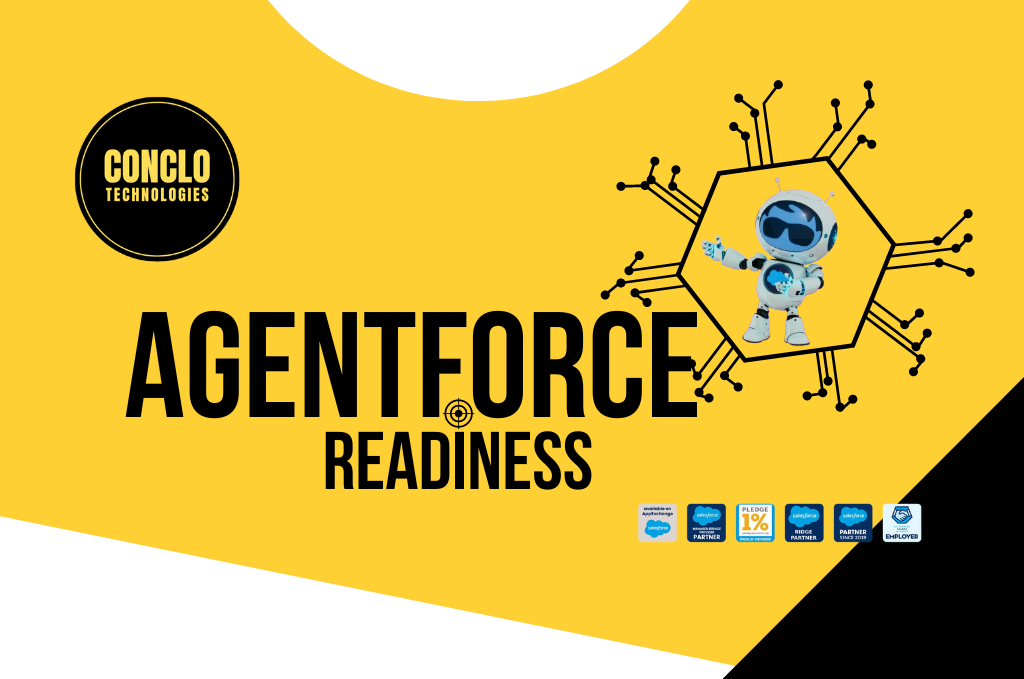Implementing Agentforce in a Salesforce environment requires careful planning and preparation to ensure a smooth deployment and optimal functionality. Here are the key prerequisites to consider:
- Salesforce Service Cloud: Agentforce is an extension of Salesforce Service Cloud, so having a Service Cloud license is a fundamental prerequisite. Organizations must ensure they have Service Cloud set up correctly with the necessary configurations to support customer service operations.
- Salesforce Platform Readiness: Before implementing Agentforce, the Salesforce environment should be up-to-date, including the latest version of Salesforce’s Lightning Experience. It’s essential to verify that the organization’s Salesforce instance is compatible with the Agentforce features and capabilities.
- System Integration: Agentforce often needs to interact with various systems such as Customer Relationship Management (CRM), telephony, and communication platforms. Businesses must ensure that APIs and integration tools are set up and tested to facilitate seamless data exchange between these systems and Agentforce.
- Data Readiness: Clean and organized data is crucial for implementing Agentforce effectively. Businesses should conduct data audits to clean up customer records, remove duplicates, and ensure data consistency. Proper data management practices should be established to maintain data quality, as Agentforce relies heavily on accurate customer information for case management and routing.
- Network and Security Infrastructure: A robust network infrastructure is essential to support the real-time interaction capabilities of Agentforce. Adequate bandwidth, low latency, and secure network configurations are required. Security protocols should be reviewed and updated to ensure that customer data is protected. This includes setting up secure access controls, encryption, and compliance with data protection regulations.
- Agent Training and Change Management: Implementing Agentforce will introduce new tools and processes for customer service agents. A well-planned training program should be in place to familiarize agents with the new interface, features, and functionalities. Additionally, change management practices should be adopted to facilitate a smooth transition and encourage user adoption.
- Technical Support and Maintenance: Organizations should establish a support framework to handle technical issues, provide maintenance, and offer user support post-implementation. This may involve designating a team responsible for managing the Agentforce platform, handling integrations, and troubleshooting.
Licenses Required for Agentforce
Implementing Agentforce requires specific licenses from Salesforce. Here are the key licenses typically required:
- Salesforce Service Cloud License: Since Agentforce is an extension of the Service Cloud, having a Service Cloud license is a basic requirement. This license provides access to core customer service features like case management, knowledge base, and multi-channel support.
- Salesforce Sales Cloud License (Optional): For organizations that also use Sales Cloud, integrating sales and service data can provide a more holistic view of customer interactions. While not mandatory for Agentforce, it can enhance the capabilities of the platform.
- Salesforce Platform License: This license is often needed to access custom applications and extend Salesforce’s functionality, which can be critical when integrating Agentforce with other business systems or customizing its features to meet specific business needs.
- Einstein AI License: Agentforce uses Salesforce’s AI capabilities to provide features like AI-powered recommendations, intelligent routing, and predictive analytics. Access to these advanced AI features requires an Einstein AI license, which enables predictive insights and automation in the Service Cloud environment.
- Third-Party Integration Licenses (If Applicable): If Agentforce needs to integrate with third-party applications, such as telephony systems or external databases, additional licenses may be required. These could include API licenses or specific third-party software licenses.
- Additional Add-Ons: Depending on the specific needs of the business, other Salesforce add-ons and licenses may be necessary. This could include licenses for additional storage, enhanced analytics, or specific industry solutions.
Implementing Agentforce successfully requires careful planning around the prerequisites, including system readiness, data quality, integration capabilities, and adequate training for agents. Securing the necessary licenses, such as those for Service Cloud, Einstein AI, and potential third-party integrations, ensures that the organization can fully leverage the capabilities of Agentforce to enhance customer service operations. By meeting these prerequisites, organizations can set the stage for a successful deployment and maximize the benefits offered by Agentforce.



